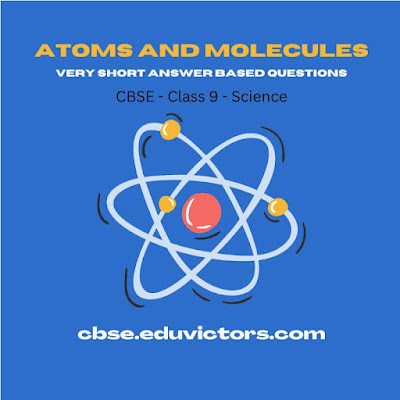CBSE Class 9 - Chemistry - Atoms and Molecules - Very Short Answer Based Questions - Answers
Q1. What is the chemical symbol of lead and mercury?
Q2. Monika finds that all samples of pure water have Hydrogen and Oxygen in ratio of 1:8 by mass. Which law does the statement agree to?
Q3. 10g of silver nitrate solution is added to 10g of sodium chloride solution. What change in mass do you expect after the reaction and why?
Q4. What is the difference between O, O₂ and O₃?
Q5. Define molecule.
Q6. Categorise the following molecules as monoatomic, diatomic, triatomic, tetraatomic, Pentaatomic and polyatomic.
CH₄, H₂O, He, S₈, N₂, NH₃
Q7. What is the atomic radius of a Hydrogen atom in metres?
Q8. Define atomic mass unit.
Q9. Give an example of bilavent cation.
Q10. Calculate the ratio by mass of atoms present in — a molecule of carbon dioxide.
(Given C = 12u, O=16u)
Q11. How many atoms are present in a PO₄²⁻ ion?
Q12. Write chemical formula of Lead Carbonate.
Q13. What is the chemical name of K₂SO₄ ?
Q14. What is the chemical name of Quicklime?
Q15. Calculate the molecular mass of Ethyne C₂H₂.
Answers:
1. Lead - Pb
Mercury - Hg
2. Law of constant proportion.
3. Since Law of conservation of mass hold good, there is no change in mass will take place.
4. O - Oxygen atom,
O₂ - Oxygen gas molecule (diatomic) and
O₃ - Ozone gas molecule (triatomic)
5. The smallest unit of a substance which can exist independently is called molecule.
6. Monoatomic: He
Diatomic: N₂
Triatomic: H₂O
Tetraatomic: NH₃
Pentaatomic: CH₄
Polyatomic: S₈
7. 10⁻¹⁰ m
8. Atomic mass unit is equal to 1/12th the mass of one atom of carbon-12.
9. Mg²⁺
10. The ratio by mass of constituting elements in carbon dioxide is:
CO₂ = 12:32 = 3:8
11. 1 P + 4 O atoms = 5 atoms
12. PbCO₃
13. Pottassium Sulphate
14. Calcium Oxide CaO
15. C₂H₂.
Atomic mass of C = 12u
Atomic mass of H = 1u
Molecular mass of C₂H₂ = 2×12u + 2×1u
= 24u + 2u
= 26u
Ch 3 - Atoms and Molecules
Ch 3 - Atoms and Molecules (Worksheet)
Ch3 - Atoms and Molecules (MCQs)
Ch 3 - Atoms, Molecules and Ions (Study Points)
Ch 3 - Atoms and Molecules (MCQs-2)
Ch 3 - Atoms and Molecules - Atomicity of Elements (Worksheet)
All about Names of the Chemical Elements
Ch 3 - Atoms and Molecules (Important Definitions)
Ch 3 - Formulae of Simple Compounds
Colour of Compounds/Salts

No comments:
Post a Comment
We love to hear your thoughts about this post!
Note: only a member of this blog may post a comment.